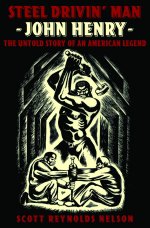Steel Drivin’ Man: John Henry (an alternate take)
The last few weeks here at ASHP we’ve been reading Scott Reynolds Nelson’s Steel Drivin ‘ Man John Henry: The Untold Story of an American Legend. The book does a fine job using John Henry’s life story as a background to discuss injustice in the South during reconstruction, but I’ll leave that to my colleagues to talk about. I’m going to briefly talk about the other narrative within the story, and that is the narrative of folk music.
‘ Man John Henry: The Untold Story of an American Legend. The book does a fine job using John Henry’s life story as a background to discuss injustice in the South during reconstruction, but I’ll leave that to my colleagues to talk about. I’m going to briefly talk about the other narrative within the story, and that is the narrative of folk music.
Dr. Nelson makes liberal use of lyric to tell parts of the story, by telling variation after variation on the John Henry song:
“Like the rocks these little songs were chipped down by regular use, repeated with tiny variations, until they took the shape of black America’s folk poetry.” -p. 76
John Henry’s ballad was not set in stone, but free to evolve; free to tell the tales of poor whites in Kentucky as well as poor rail workers in Virginia. Some variations of Steel Workin’ Man took on the ballad form, a staple of Anglo-American song which dates back to the 16th century whereas others had more in common with spirituals or even as organizational songs to coordinate the stroke of a hammer on the line.
Perhaps the tragedy of folk music was the notion of copyright and ownership which befell many of these classic songs. Whereas old American folk music staples like “House of the Rising Sun” or “Wayfaring Stranger” had meandered from person to person through oral tradition through practically limitless variations, music is unable to follow this same path anymore. For example The Animal’s version of “House of the Rising Sun” has become the de-facto standard, though many variations exist from with the song told from the perspective of a woman.
Modern music rarely is given the same flexibility. A child today can listen to the same recording and same Beatles song that his mother and father listened to forty years ago. Covers are uncommon, due to royalty payments and many coffee shops will go so far as implore budding singer-songwriters to not play any covers on their stage. Writers are not re-interpreting Britney Spears to make her more valid to their own lives. J.D. Salinger’s Catcher in the Rye has had its relevance questioned due to the fact the narrative adolescents are reading has not changed in fifty years.
I’m not proposing that all copyright law be turned on its head; however, I think that Dr. Nelson’s book draws attention to our modern folk culture and draws awe by showing how one song could endure over so many groups and people over so many years and have its relevance to their lives go unquestioned.
Last 5 posts by ASHP Staff
- FDR's Tree Army [now on Vimeo] - March 13th, 2013
- December Roundup - December 19th, 2012


